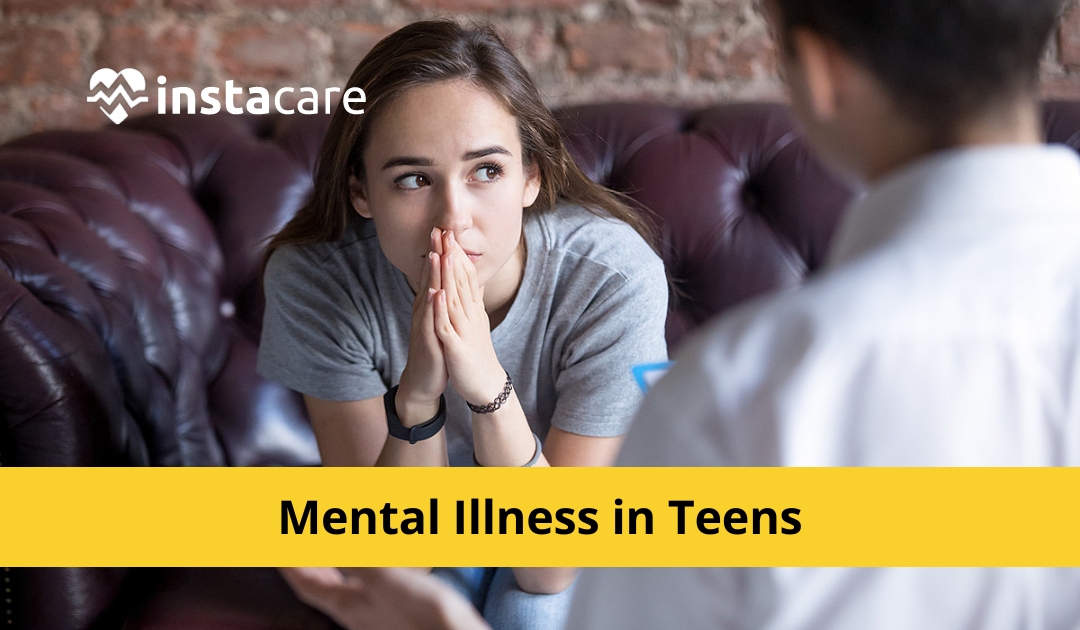What is Mental Illness?
Mental illness is a broad term that covers a wide range of conditions and symptoms. It is characterized by changes in emotion, thought, behavior, and functioning that disrupts one's ability to cope with everyday life. Mental illness can be caused by biological factors, such as genetic vulnerabilities or an imbalance in neurotransmitters, or they can be triggered by environmental stressors and experiences like trauma, poverty, or loss. Mental illness also affects physical health; it can impair the body’s immune system leaving people vulnerable to illnesses and diseases. Those who suffer from mental health issues require recognition and treatment to minimize their suffering and live healthier lives.
Types of mental illness in teens
Teenagers experience a wide range of mental health issues, including anxiety, depression, bipolar disorder, attention deficit-hyperactivity disorder (ADHD), and eating disorders. Each type of mental illness can present with its own unique set of symptoms and behaviors that can have a significant impact on power dynamics such as relationships with peers or adults. It is essential for adults to be aware of the mental health challenges teens may face in order to provide appropriate supports and interventions both in their immediate life and in the future. Mental health issues should not be taken lightly; instead, they should be addressed through evidence-based treatments such as counseling and medications prescribed by qualified mental health professionals. By recognizing these important issues, adults will play an integral part in helping teenagers cope with these challenging illnesses.
Causes teenage mental illness
Teenage mental illness is a serious issue that can present itself through a variety of emotions, behaviors, and symptoms. There are numerous potential causes of mental health problems among teens, including genetics, environmental factors such as family upbringing or living circumstances, physical or sexual abuse and trauma, hormonal changes due to puberty, and even difficult life events like the death of a parent or divorce. Additionally, struggling with substance use or abuse can contribute to the onset of mental illnesses during adolescence. It is critical for teenagers struggling with any form of mental health issues to have access to proper diagnosis and treatment from a qualified healthcare provider in order to achieve real healing.
View More: Benefits Of Breastfeeding For Both Mother And Baby
Signs of mental illness
Mental illness is a complex and confusing topic, but there are telltale signs that someone may be struggling with mental health issues. If someone suddenly appears to have lost interest in activities they used to enjoy, are sleeping more or less than usual, or experience changes in their appetite, they could be exhibiting symptoms of mental distress. It's equally noteworthy if someone's relationships with friends and family become strained or if they begin to withdraw from socializing altogether; these could be signs of an underlying mental health issue. Lastly, any sudden shift in behavior accompanied by outbursts of anger or sadness should not be overlooked as it could be a sign of depression or other emotional problems. Fortunately, there is help available for those who need it.
Treatment of Mental Illness
Mental illness affects millions of people around the world and yet, it is still very much a taboo subject. Attitudes around mental health are slowly beginning to change, with more open discussion taking place in society and greater understanding of its associated issues. Thankfully, there is an increased availability of treatment options solely dedicated to helping sufferers manage their conditions. There are now better diagnoses and more efficient medication management as well as counseling and therapy treatments that can help individuals understand their illnesses better. Traditional forms of medicine like yoga, mindfulness exercises and relaxation techniques can also be incredibly effective in helping individuals cope with the daily struggles of mental illnesses. Despite the great strides being made to improve its treatment, we still have a long way to go in improving the overall care for those affected by this condition.
Teenage mental illness test
It is important to be aware of teen mental illness, as this age group is particularly vulnerable to mental health issues. Testing can be a powerful tool in diagnosing and treating illnesses like depression, anxiety and bipolar disorder before symptoms become more severe. But when it comes to teenagers, there must be a careful balance between assessing their mental well-being and respecting their right to privacy. That's why it's important to choose a professional testing service that delivers accurate results while ensuring the confidential information remains secure. Doing so will help equip teens with the knowledge they need to learn healthy coping strategies and lead fulfilling lives.
How do I know if my teenager is mentally ill?
Identifying mental illness in teenagers can be difficult, as they often experience similar changes to their behavior and moods during puberty. However, being aware of, and looking out for potential red flags is important. If your teen displays signs of constant worry or difficulty concentrating, expresses feelings of helplessness or extreme sadness, withdraws from family members and activities they previously enjoyed, experiences sudden changes in eating habits, engages in reckless behavior such as drug use or self harm, or has severe mood swings without any identifiable causes then it might be an indication that something more serious is going on. If you think your teenager may be suffering from a mental health condition then it's best to reach out for support from a qualified professional who specializes in adolescent psychology and can provide an accurate diagnosis and appropriate treatment plan.
View More: When Can Babies Start Drinking Juice
Most common mental illness in youth
Mental health issues in young people are on the rise; depression, anxiety and Eating disorders are some of the most common mental illnesses among teens. Depressive disorders can make it hard for adolescents to concentrate on their studies or participate in activities with friends. Anxiety disorders can cause difficulty connecting with others and lead to feelings of panic. Eating disorders, such as Anorexia Nervosa and Bulimia, have particularly increased among adolescents, negatively impacting their physical health as well as mental well-being. Whatever the issue may be, it is important for parents to be aware of these disorders and take responsibility for their children's mental health. It is likewise essential that teenagers be informed about these issues so they know where to turn for help if needed.
How to help a teenager with mental health issues
Supporting a teenager with mental health issues can be a difficult and challenging task. However, it is important to remember that teenagers need understanding, patience, and compassion. It is important to look out for any signs of possible self-harming behaviors or depression. Acknowledging their feelings and allowing them to open up in an environment free of judgement is beneficial. Parents should also encourage their children to eat nutritious meals, exercise regularly, get enough sleep, and pursue hobbies they enjoy. Additionally, getting the right professional support such as counseling with a therapist can be crucial in providing your teen the help they need. Ultimately, creating a loving environment while protecting healthy boundaries is essential in helping teenagers manage mental health issues both now and in the future.
If you want to consult with the best pediatrician in Pakistan, book an appointment through InstaCare or you can call helpline number 02137136090 for assistance to find the right professional for your concerns.












